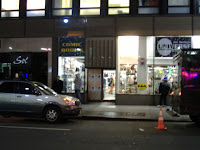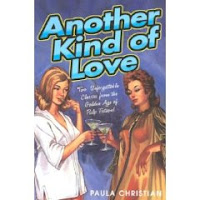 A few months ago, I mentioned that I created a page on the Japanese social networking site Mixi. It’s been a very good exercise so far. For one thing, I have to be semi-coherent in Japanese when I post there, so I’m forced to practice my appalling communication skills. Because I am a shameless American, I’ve been wandering around the Mixi communities, introducing myself and pimping Yuricon & ALC Publishing where it seems to fit.
A few months ago, I mentioned that I created a page on the Japanese social networking site Mixi. It’s been a very good exercise so far. For one thing, I have to be semi-coherent in Japanese when I post there, so I’m forced to practice my appalling communication skills. Because I am a shameless American, I’ve been wandering around the Mixi communities, introducing myself and pimping Yuricon & ALC Publishing where it seems to fit.
Well, one day I got a message – always an occasion of entertainment, (I’m not afraid of rare hunters who just want me for my strangeness.) This message, however was a very polite comment from someone named Nakamura who thought that since I seem to like Yuri manga, I might be interested in their new manga series. The post they linked me to starts “A non-moe Yuri manga.” My cute little ears pricked up because, of course, I *long* for non-moe Yuri stories.
Let me side-step a second. The day before I received this message I was trawling the Yuri board at 2chan and saw a picture which interested me greatly. I didn’t read the post, because I was in a rush. But the art really stuck out because it was two adult women, looking decidedly grim and I liked it instantly.
So, when I popped onto Nakamura-san’s page and find myself staring at the same exact picture, I think my heart rate increased a little. Probably got a little color in my sallow cheeks as well. After reading the description of the series, I fearlessly added Morning 2 magazine to my last order from Amazon JP.
Friends, I just want to say this, Gunjou is awesome and Nakamura Ching is da BOMB. Thank you, thank you, Nakamura-san for pointing out your new series to me!
As I reported in my Yuri News report a few weeks ago, Gunjou by Nakamura Ching is the story of a woman who asks the lesbian who is in love with her to kill her husband, and their life on the road after the deed is done.
The woman, whom I will refer to as “BN” for “brunette,” because she as yet has no name, is not a nice person. If I was her husband, I’d probably be abusive too. She’s manipulative, self-absorbed and nasty. Her friend, who is also nameless, so will be referred to as “BL” for “blonde,” is a lesbian who has been in love with BN for some time. She identifies as a lesbian and she’s prone to fits of violence. Needless to say, as I read Gunjou I practically shuddered with ecstasy. A nasty woman and the EPL who loves her. Sounds like my household. LOL
In chapter 4, which is where I picked the story up, they are casually discussing how they would want to kill themselves. BL suggest self-immolation with gasoline – and buys some just in case they want to try it. They return to BN’s childhood home, since her parents are safely dead. She tells BL how much they and her husband trapped her for her entire life. She heads off to have a cigarette and take a walk – we later see her at the public phone. BL finds some ero-magazines and picks one up, only to find that the girl in the story being schtupped looks scarily like BN. They find a game of LIFE and start to play, but in a fit of nasty, BN trash talks BL, then tells BL that she called the police on her. BL beats the bejeebus out of BN, then threatens her life with a broken bottle. BN begs for her life, they drink, they eat some sushi and go outside for a walk. Whereupon BL douses herself in the gasoline. But then worries when BN takes out a cigarette. The chapter ends with them both sitting on the ground outside the car, BN’s hand on BL’s thigh and BL carefully holding BN’s lighter.
Chapter 5 starts with some color pages, and BL with wounds that look like knife marks on her chest. No hospital, she says, in her near dementia. BN has no clue what to do, but she remembers BL talking about an older cousin she used to visit in the area where they went to school, so BN heads there. They park, BL saying she doesn’t want to go to a hospital, and BN saying that she isn’t – they are at her cousin’s place. “I don’t have a cousin,” BL says, just as her (obviously) ex-lover walks up. Woops. LOL
BN is laying on a futon on the floor when BL starts to gag and vomit. The lover comes in and comforts her, and in case we were very stupid, she holds her close, they have a lover’s reunion right there, while BN eats her own liver out. The whole thing is massively awkward. As BL recovers, the lover takes BN out to dinner, blames her for the failure of their (BL x lover’s) relationship, and the current state of things. After gently tipping her dinner over BN’s head, the lover proceeds to try to strangle her to death, saying she won’t give BL back now that she has her again.
BN drops the car keys into the car and starts to walk away, but BL leaves her lover with an apology. As the chapter ends, the two of them walk off arm in arm.
The art is a bit unusual, josei meets action drama – but don’t get me wrong, this is NOT a josei manga. Morning is a guy’s magazine and this is a manga for an adult, male, audience. The characters aren’t attractive, but that’s more because their expressions are often distorted by rage, frustration and bile, than anything else. Every once in a while they soften and you instantly begin to like them.
While I’ve focused on the major drama in the synopsis, there’s actually quite a bit of softer character development going on. And despite the dysfunction and manipulation, the relationship between BN and BL has some moments that are really quite tender. Since Nakamura-san describes this series as a Yuri series, I’m very interested to see how their relationship develops. I don’t see a *happy* end in the future, but I bet it’s interesting. I’ll definitely be following the series as it comes out in Morning – hopefully a tankoubon will be out soon.
Ratings:
Art – 8
Story – 8
Characters – 6 for anyone sane, 9 for me
Yuri – 4
Loser FanErica – 10
I cannot *wait* until the next chapter. I might just die from anticipation!







